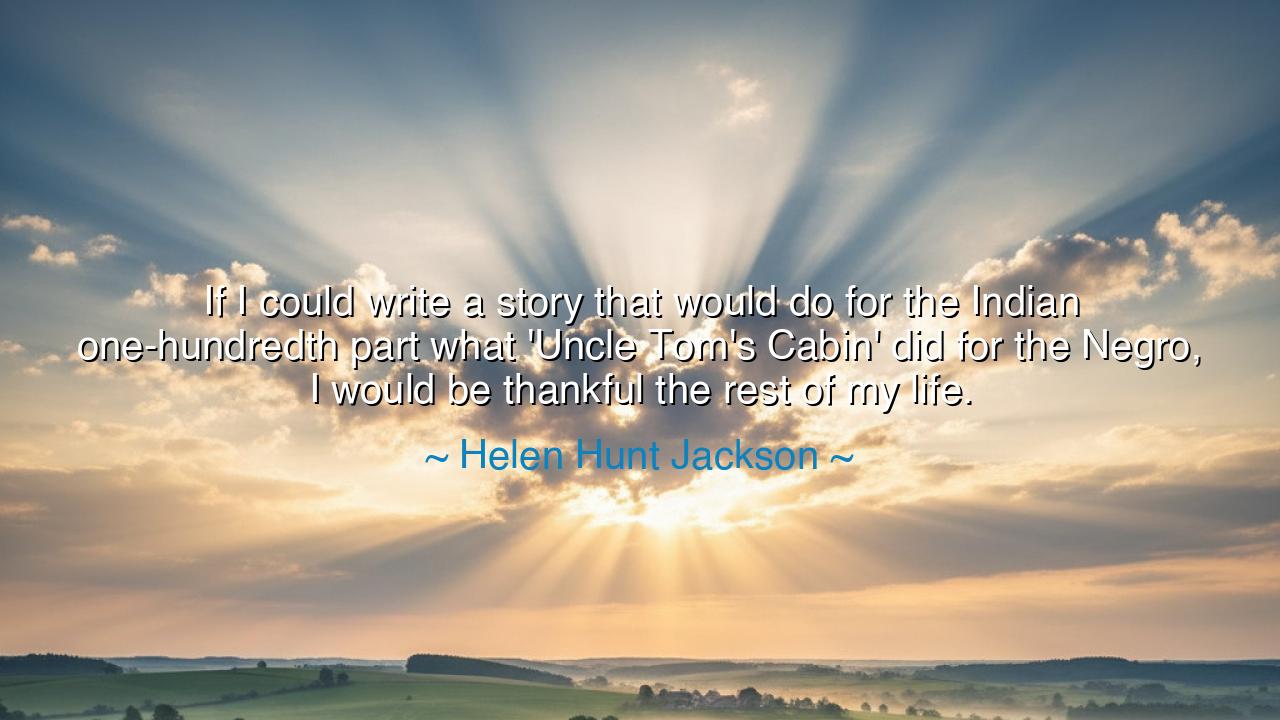
If I could write a story that would do for the Indian
If I could write a story that would do for the Indian one-hundredth part what 'Uncle Tom's Cabin' did for the Negro, I would be thankful the rest of my life.






Hear the voice of Helen Hunt Jackson, a woman who carried both the pen of compassion and the fire of justice, who once declared: “If I could write a story that would do for the Indian one-hundredth part what Uncle Tom’s Cabin did for the Negro, I would be thankful the rest of my life.” These words are not idle musings, but a cry of conscience, born of an age when injustice weighed heavily upon the native peoples of America. In her longing we hear the ancient truth—that words, when wielded with courage, may shake empires, awaken nations, and redeem the dignity of the oppressed.
The ancients themselves knew this power of the written word. Did not Solon, the lawgiver of Athens, transform his city with verses as well as laws? Did not the prophets of Israel write words of flame that struck kings to their knees? So too did Harriet Beecher Stowe, with her book Uncle Tom’s Cabin, pierce the conscience of America, stirring the hearts of millions and fanning the fires that would lead to the abolition of slavery. Helen Hunt Jackson longed to wield her story as such a weapon—not for herself, but for the forgotten voices of the Indian, whose suffering was concealed beneath the march of progress.
Her words are heavy with humility. She does not claim she could match Stowe’s influence; instead, she speaks of doing even a “one-hundredth part” of that work, and for this she would remain thankful for the rest of her days. Such humility reveals her understanding of the enormity of the task. To shift the tide of a nation’s prejudice is no small thing. Yet her thankfulness would not be for her own glory, but for the healing of wounds, the restoration of justice, and the vindication of those whose humanity had been denied.
History shows us the path she attempted. Her book A Century of Dishonor was sent to every member of Congress, a testament of the broken treaties and injustices inflicted upon Native tribes. Later, her novel Ramona sought to do with story what policy could not—to stir compassion in the public heart. Though her works did not ignite the vast reform she desired, they became enduring voices in the struggle for recognition of the Indian, echoing through generations as calls to conscience.
Consider how the ancients honored those who spoke for the voiceless. Demosthenes, with his fiery orations, roused Athens against tyranny. And in Rome, Cicero risked his life by raising his voice against corruption. Helen Hunt Jackson belongs to this same tradition. Though she wielded no sword, her pen became her weapon; though she commanded no armies, she fought with story and compassion. Her words remind us that even the humblest writer, if possessed of truth, may strike harder than the soldier’s spear.
The origin of this quote lies not in her ambition but in her empathy. Jackson saw in the Indian the same plight that Stowe revealed in the enslaved African-American: lives crushed beneath indifference, cultures dismantled by greed, dignity stripped by law. She understood that reform must begin in the heart, and that literature has the power to soften hearts where arguments alone may fail. In this vision she found her purpose, and in that purpose she found the gratitude she longed to carry all her life.
The lesson is clear: if you possess a gift—whether of pen, of voice, of art—use it to lift others. Do not measure your worth by whether you change the entire world; even if you move the heart of one person, you have done a sacred work. Be thankful for the chance to serve, and pour yourself wholly into the task, for no labor of justice is wasted. Every voice raised for the forgotten becomes part of a greater chorus that, in time, can shake the foundations of oppression.
Practical wisdom calls to you: read the stories of the oppressed, carry them forward, and let them shape your choices. If you write, write for truth; if you speak, speak with courage; if you act, act with compassion. Like Helen Hunt Jackson, set your heart not on fame, but on impact, however small. For the ancients teach, and her words affirm, that gratitude is found not in self-glory but in service. And the one who serves with thankfulness leaves behind a legacy more enduring than monuments of stone.






AAdministratorAdministrator
Welcome, honored guests. Please leave a comment, we will respond soon